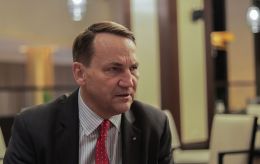SPD of Scholz leads in Brandenburg elections, but far-right breaths down their necks - Reuters
 Chancellor of Germany Olaf Scholz (photo: Getty Images)
Chancellor of Germany Olaf Scholz (photo: Getty Images)
In the local elections in the German state of Brandenburg, the Social Democratic Party of Germany (SPD), led by Chancellor Olaf Scholz, is in the lead. The far-right Alternative for Germany (AfD) is in second place, trailing by a narrow margin, reports Reuters.
On Sunday, the elections were held for the local parliament in the federal state of Brandenburg. Throughout the campaign and in the lead-up to the vote, the SPD lagged behind the Alternative for Germany (AfD), but the results provide hope for a victory for Scholz's party over the far-right.
Drop of optimism
According to preliminary official results published by the State Electoral Commissioner, the SPD, which has governed the area around Berlin since reunification in 1990, received 30.9% of the votes, while the AfD garnered 29.2%.
Exit polls from ARD indicate that three-quarters of voters who supported the SPD did so not out of conviction but rather to shield themselves from the far-right AfD. ZDF reported that voter turnout rose to 73%, up from 61% five years ago.
At the national level, the SPD only commands 15%, a drop from 25.7% in the federal elections of 2021. It trails the AfD by about 20% and the opposition conservatives by 32%.
At the same time, Reuters reports that the AfD continues to gain momentum. According to preliminary official results, it has increased its share by 5.7 percentage points since the last elections in Brandenburg in 2019.
AfD co-leader Tino Chrupalla noted that the party has seen significant growth among young voters - a trend reflected among far-right parties across Europe in the EU elections in June.
All three parties in Scholz's ideologically diverse coalition (the SPD, the Greens, and the Free Democrats Party) currently have around 30% combined, which is less than the conservatives.
"The coalition has come under fire for its constant bickering and for its handling of immigration. In the formerly Communist-run East, many voters are also critical of its delivery of weapons to Ukraine to help it fend off Russia's full-scale invasion," Reuters reports.
The agency notes that the SPD's success may provide Scholz with a brief reprieve from party discussions about his suitability to run again as the chancellor candidate in the federal elections scheduled for September 2025, given his unpopularity among voters.
However, this is unlikely to give him or his party a significant boost, as the popular current SPD premier of Brandenburg, Dietmar Woidke, distanced himself from Scholz during the campaign and criticized the federal government's policies.
Results of other political forces
The new leftist Alliance of Sahra Wagenknecht secured third place in the Brandenburg elections with 12% of the votes, surpassing the conservatives, who garnered 11.6%. This highlights the ongoing upheaval in Germany's political landscape, making predictions challenging.
The Greens, one of Scholz's junior coalition partners at the federal level, received 4.1%, slightly below the 5% threshold required for automatic entry into the state parliament.
The result for another junior coalition partner, the Free Democrats, was too minimal to be reflected in the polling.
As the Greens failed to re-enter the Brandenburg state parliament, Woidke's SPD cannot continue the coalition with the CDU and the Greens. Projections also indicate that neither the SPD nor the CDU can achieve a majority on their own.
Local elections in Germany
On September 1, the local elections were held in the eastern German states of Thuringia and Saxony.
According to the voting results, for the first time since World War II, the far-right Alternative for Germany (AfD) secured the top position in Thuringia. In contrast, in Saxony, the Christian Democratic Union (CDU) slightly edged out the AfD.
For more on how the local elections in Germany could pose challenges for Ukraine, read the full article by RBC-Ukraine.


